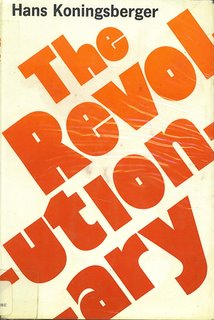
(Book Review)
This book is an attempt to capture the psych of the typical revolutionary. It is often compared to Camus’s “The Rebel” and Malraux’s “Man’s Fate.”
I’ve not yet read “The Rebel” (add that to my reading list), “Man’s Fate” is one of my favorite books of all time. It is about the Chinese Communist’s defeat in Shanghai 1927. (I first read it as part of my “Western Perceptions of China” class, the same class in which I was first exposed to Fu-Manchu.)
Like “The Revolutionary”, “Man’s Fate” attempts to capture the confusion and disillusions of the revolutionary. But much of the genius of “Man’s Fate” is that it is attached to a real historical event. By contrast, “The Revolutionary” occurs no where. It takes place in an unnamed country, at an unspecified time, in an unknown city. The political parties are referred to simply as “The Radical Party” or “The Reds” and the main character is known simply as “A.” The idea is that it can be taken to refer to any revolutionary at any given time.
I’m told (although some of you literary types might be able to correct me on this) that at one time it used to be stylish for writers to write novels without any specific setting. Personally I think this book would have been a lot better if, life “Man’s Fate” it had been connected to an actual historical event. But that being said, this book is not as bad as it sounds. A good writer can draw the reader into even a non-existent world, and I think Koningsberger does a good job of making “A.” seem like a real person.
The book deals a lot with the disconnect between the romantic dreams of revolution, and the day to day drudgery of working late in a print shop or waiting in the freezing cold at a rendevous point. Although I would be flattering myself to claim the title of a revolutionary, I think everyone who has been involved in activism can identify with this to some extent. As A. Explains near the end of the book,
“You mustn’t be disappointed. I know this is not the way you’d expect things to be. Me neither. It’s hard to explain...from a distance, when you’re sort of floating above it all, it seems so simple, just a matter of being determined. But then the closer you are, the more complicated it is. You get lost in details.”
This book was made into a film in 1970, starring Jon Voight and Robert Duvall. I've never seen the film, but appearently it made Roger Ebert's top 10 list for that year.
Useless Wikipedia Fact
The recording session for the song "I Will" turned into a jam session, producing the short "Can you take me back"-segment that introduces "Revolution 9" on most versions of the album, as well as "Los Paranoias" (released on Anthology 3). This quiet song required 67 takes
Link of the Day
More Japanese Music.
君といつまでも--This is one of my favorite Japanese songs, although I didn't care for it the first time I heard it. Maybe it's one of those songs that has to grow on you. I put it on my mixed cassette tape just to fill up space, but then one night when I took a wrong turn in the country side and was driving around at night surrounded by just empty rice fields, this song came on. I think to fully appreciate it you have to listen to it with that kind of atmosphere in mind.
A couple notes about this video: first of all it has a long introduction, so you can just skip 2:10 minutes into it to hear the actual song if you're impatient.
Secondly, obviously this is a later performance when the singers are a bit older. But the song sounds almost exactly the same as on the original recording.
The Revolutionary by Hans Koningsberger Book Review (Scripted)
No comments:
Post a Comment